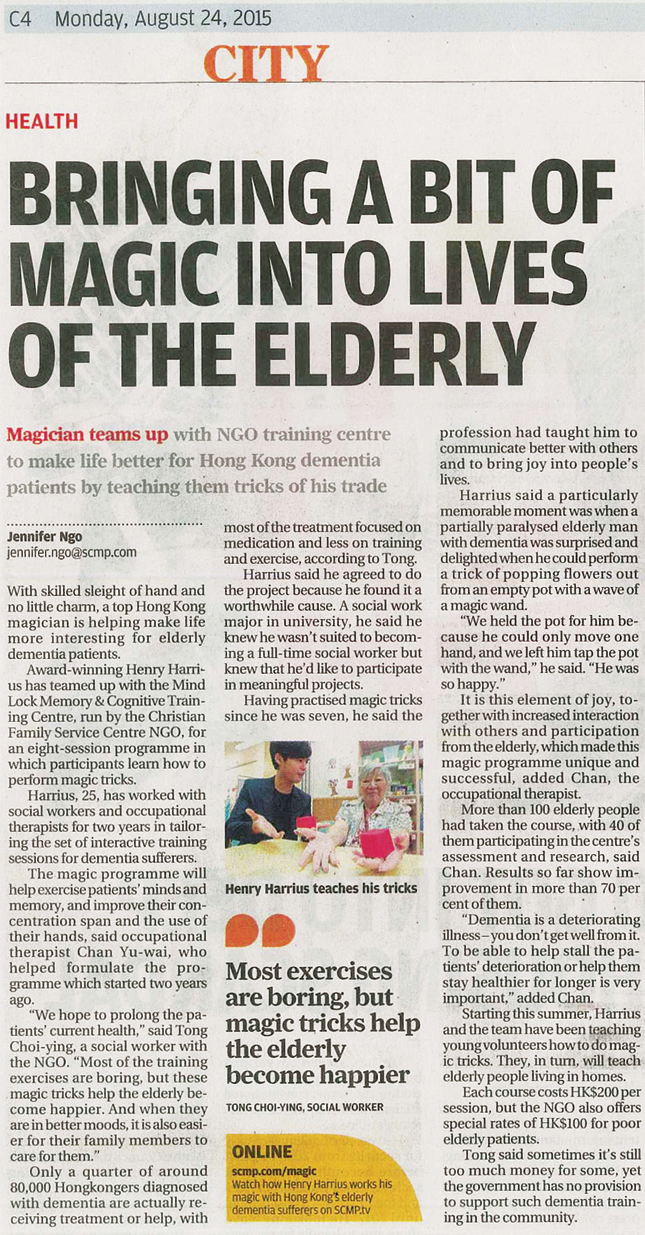過往活動
Media Coverage: Bringing a bit of magic into lives of the elderly
2015/08/24
| Date: | 24th August, 2015 (Monday) |
| Source: | South China Morning Post – C4 – City – Health |
| Re: | Bringing a bit of magic into lives of the elderly |
| Ref: | Please Click Here |
With skilled sleight of hand and no little charm, a top Hong Kong magician is helping make life more interesting for elderly dementia patients.
Award-winning Henry Harrius has teamed up with the Mind Lock Memory & Cognitive Training Centre, run by the Christian Family Service Centre NGO, for an eight-session programme in which participants learn how to perform magic tricks.
Harrius, 25, has worked with social workers and occupational therapists for two years in tailoring the set of interactive training sessions for dementia sufferers.
The magic programme will help exercise patients' minds and memory, and improve their concentration span and the use of their hands, said occupational therapist Chan Yu-wai, who helped formulate the programme which started two years ago.
"We hope to prolong the patients' current health," said Tong Choi-ying, a social worker with the NGO. "Most of the training exercises are boring, but these magic tricks help the elderly become happier. And when they are in better moods, it is also easier for their family members to care for them."
Only a quarter of around 80,000 Hongkongers diagnosed with dementia are actually receiving treatment or help, with most of the treatment focused on medication and less on training and exercise, according to Tong.
Harrius said he agreed to do the project because he found it a worthwhile cause. A social work major in university, he said he knew he wasn't suited to becoming a full-time social worker but knew that he'd like to participate in meaningful projects.
Having practised magic tricks since he was seven, he said the profession had taught him to communicate better with others and to bring joy into people's lives.
Harrius said a particularly memorable moment was when a partially paralysed elderly man with dementia was surprised and delighted when he could perform a trick of popping flowers out from an empty pot with a wave of a magic wand.
"We held the pot for him because he could only move one hand, and we left him tap the pot with the wand," he said. "He was so happy."
It is this element of joy, together with increased interaction with others and participation from the elderly, which made this magic programme unique and successful, added Chan, the occupational therapist.
More than 100 elderly people had taken the course, with 40 of them participating in the centre's assessment and research, said Chan. Results so far show improvement in more than 70 per cent of them.
"Dementia is a deteriorating illness - you don't get well from it. To be able to help stall the patients' deterioration or help them stay healthier for longer is very important," added Chan.
Starting this summer, Harrius and the team have been teaching young volunteers how to do magic tricks. They, in turn, will teach elderly people living in homes.
Each course costs HK$200 per session, but the NGO also offers special rates of HK$100 for poor elderly patients.
Tong said sometimes it's still too much money for some, yet the government has no provision to support such dementia training in the community.


